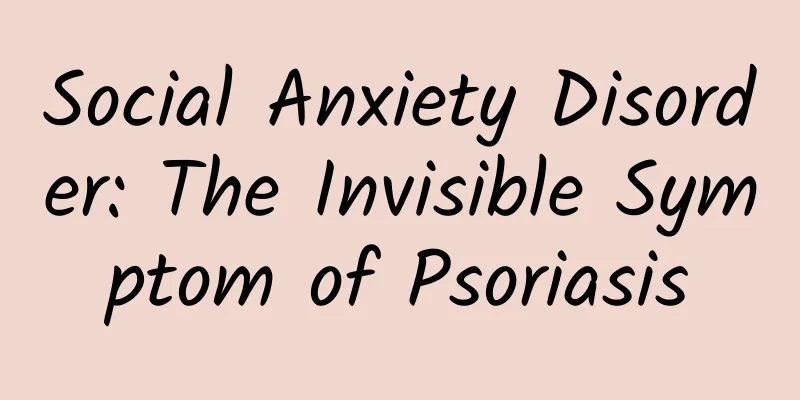Social Anxiety Disorder: The Invisible Symptom of Psoriasis

|
What is social anxiety disorder? Social anxiety disorder is a common psychological symptom of psoriasis. Social anxiety is an emotional experience of feeling uncomfortable, unnatural, nervous or even fearful when interacting with others. For patients with severe social anxiety disorder, daily activities such as walking, shopping and even making phone calls are very challenging. Overview of Social Anxiety in Psoriasis Patients Psoriasis lesions are characterized by scaly plaques that can affect any part of the body. Worldwide, there are approximately 125 million psoriasis patients, and their disfiguring appearance can cause them to gradually become depressed, anxious, and even suicidal. Skin conditions can affect people's emotional health and interpersonal relationships. Due to the particularity of psoriasis, most patients suffer from anxiety and depression at the same time. According to a survey, about 63% of patients feel that psoriasis has seriously affected their lives; 47% of patients have a certain degree of anxiety and depression symptoms; 11% of patients believe that the disease will make their lives worse than death; and psoriasis patients who develop the disease due to mental factors account for about 15.7% of the total number of patients. The main manifestations of social anxiety disorder are as follows : fear of being stared at and commented on; believing that others can see his unnatural expressions and embarrassment; believing that others' evaluation of himself is bad or even contemptuous; avoiding or enduring feared situations; and often having physical symptoms such as blushing, hand tremors, nausea or frequent urination in feared situations. Classification of social anxiety disorder Chronic anxiety: Generally, chronic anxiety is typically manifested by five major symptoms, namely, palpitations, fatigue, nervousness, shortness of breath and chest pain. In addition, there are tension, cold sweats, fainting, belching, nausea, abdominal distension, constipation, impotence, frequent urination and urgency. Acute anxiety: mainly manifested as panic attacks, which often occur during sleep at night, with a feeling of impending death. The patient's heart beats violently, the chest feels stuffy, and the throat feels blocked. It can also induce numbness in the limbs and abdominal distension, further aggravating the patient's fear. Negative emotions in psoriasis patients Psoriasis is currently incurable and often manifests itself in symptoms such as itching and desquamation. Patients are prone to greater psychological pressure and thus psychological disorders. Poor psychological conditions will lead to patients not cooperating with treatment and worsening of the condition. Patients may also experience negative emotions such as shame, anxiety, and depression, which can affect the patient's quality of life and disease treatment, thus creating a vicious cycle. Type A behavior in patients with psoriasis Type A behavior is a behavioral characteristic proposed by experts in California, USA. Its specific manifestations include striving for achievement, competitiveness, easy impatience, sense of time urgency, rude words and behavior, over-commitment to work and career, high energy and excessive hostility. The proportion of Type A behavior in patients with psoriasis is significantly increased. How to deal with anxious thoughts? In the field of anti-anxiety treatment, the three most effective treatment options include medication, psychotherapy and exercise. Psychotherapy alone can improve mild anxiety, but for most patients, it is best to combine psychotherapy with medication. What should be noted when taking anti-anxiety drugs? Regular check-ups, quit smoking and limit alcohol consumption. After the start of treatment, patients need to have regular check-ups of blood routine, liver and kidney function, etc. It is recommended to have the first check-up two weeks after taking the medication, and then, if there are no special circumstances, you can have another check-up about one month later. Do not stop taking the medication suddenly. Anti-anxiety medication cannot be stopped suddenly. If the symptoms are well controlled with one pill, you can first reduce it to half a pill, and then reduce it to 1/4 pill after taking it for a while. This way, you can gradually reduce the dosage until you stop taking the medication completely. The process of stopping the medication will take at least 2 weeks, or even 4 weeks to complete. Psychological Therapy Cognitive behavioral therapy (CBT) is a type of psychological therapy that helps people with psoriasis learn to challenge negative thinking patterns and behaviors. CBT is an effective treatment for psoriasis and can help reduce the severity of symptoms. Implementing comprehensive interventions Health education: Explain relevant knowledge, characteristics and coping measures to patients and their families in a targeted manner, and provide necessary medical and nursing guidance. Psychological intervention: Medical staff make a preliminary assessment of the psoriasis patient’s personality, cultural literacy, and psychological state, and then provide targeted emotional support. How can patients with psoriasis overcome anxiety? Relaxation Psoriasis patients can use relaxation therapy to relieve anxiety-related discomforts such as palpitations, muscle tension, and sweating, including deep breathing and appropriate soothing exercises. Stay positive You should maintain an optimistic attitude and give yourself positive suggestions when you lack self-confidence, such as I can do it, I am sure I can do it. Learn to talk Psoriasis patients should learn to talk, communicate with close people, and vent their negative emotions. Psoriasis is not contagious, and people can work, live, study, and fall in love just like normal people. Distracting attention If you are feeling upset recently, go to the suburbs to see the scenery outside, listen to soothing music, pay attention to proper rest, and get enough sleep. (Yang Meng, Nanning Second People's Hospital) |
<<: 10 Steps to Understanding and Preventing Psoriasis in Children
>>: Psoriatic arthritis, a problem that cannot be ignored
Recommend
85 days of pregnancy, the gender can be vaguely seen
Key reminder: When a woman is 80 days pregnant, t...
How to use breast enhancement essential oil
Everyone is familiar with essential oils. Now man...
The physiological effects of progesterone are
Estrogen, also known as progesterone, plays a ver...
Treatment for female breast enlargement
The problem of female breast development makes ma...
Diet therapy for hair loss on the top of girls' heads
Hair loss is very common. Many people have experi...
Black vaginal discharge during ovulation
Abnormal leucorrhea is caused by vaginal diseases...
What to do if pregnant women have pharyngitis and cough
Many people will experience symptoms such as phar...
Girl's vagina has granules
In our daily life, many women find that there are...
Why are the left and right breasts different in size?
Breasts are the symbol of femininity and also the...
Can pregnant women eat cabbage?
Pregnancy is a happy and hard thing. While expect...
How to drain uterine fluid
Uterine effusion is very common, and many women w...
What kind of material is good for bathroom ceiling? What kind of material is good for bathroom ceiling?
We all know that the bathroom is a very important...
Normal episiotomy wound recovery picture
The episiotomy wound is very familiar to women wh...
Causes of calf pain in women
In fact, most female friends have their own caree...
What to do if a woman has a prolapsed uterus?
In our daily life, many women are always troubled...









